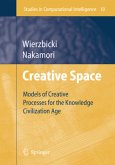"Creative Environments" is a follow-up on the book Creative Space in the same series and by the same authors, serving this time as editors of a broader book on computational intelligence and knowledge engineering tools for supporting knowledge creation. This book contains four parts. The first part presents a further development of models of knowledge creation presented already in Creative Space, in particular the Triple Helix of normal academic knowledge creation and a new, integrated model of normal academic and organizational knowledge creation, called Nanatsudaki (seven waterfalls) Model. The second part presents computational intelligence tools for knowledge acquisition by machine learning and data mining, for debating, brainstorming, for roadmapping and for integrated support of academic creativity. The third part presents the use of statistics for creativity support, virtual laboratories, gaming and role playing for creativity support, methods of knowledge representation and multiple criteria aggregation, distance and electronic learning. The last part addresses knowledge management and philosophical issues and contains chapters: on management of technology and knowledge management for academic R and D; on knowledge management and creative holism or systems thinking in the knowledge age; on technology and change or the role of technology in knowledge civilisation; on the emergence of complex concepts in science; and the final chapter on summary and conclusions, including a proposal of an integrated episteme of constructive evolutionary objectivism, necessary for the knowledge civilization age.
From the reviews:
"This book demonstrates the numerous types of reciprocal relationships between knowledge, creativity, and documentation ... and many more cognitive/intellectual inter-dependencies. ... The style of presentation (layout and format) is superb because of the many diagrams/graphics and various types, tables and models ... . as all professions deal with knowledge, creativity, innovation, data bases, documentation, [...] there is in reality no limit to the book's appeal: all theoretical/abstract and pragmatic/applied data are fundamentally highly relevant." (Karl H. Wolf, Journal of Documentation, Vol. 65 (3), 2009)
"This book demonstrates the numerous types of reciprocal relationships between knowledge, creativity, and documentation ... and many more cognitive/intellectual inter-dependencies. ... The style of presentation (layout and format) is superb because of the many diagrams/graphics and various types, tables and models ... . as all professions deal with knowledge, creativity, innovation, data bases, documentation, [...] there is in reality no limit to the book's appeal: all theoretical/abstract and pragmatic/applied data are fundamentally highly relevant." (Karl H. Wolf, Journal of Documentation, Vol. 65 (3), 2009)








